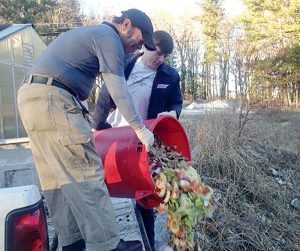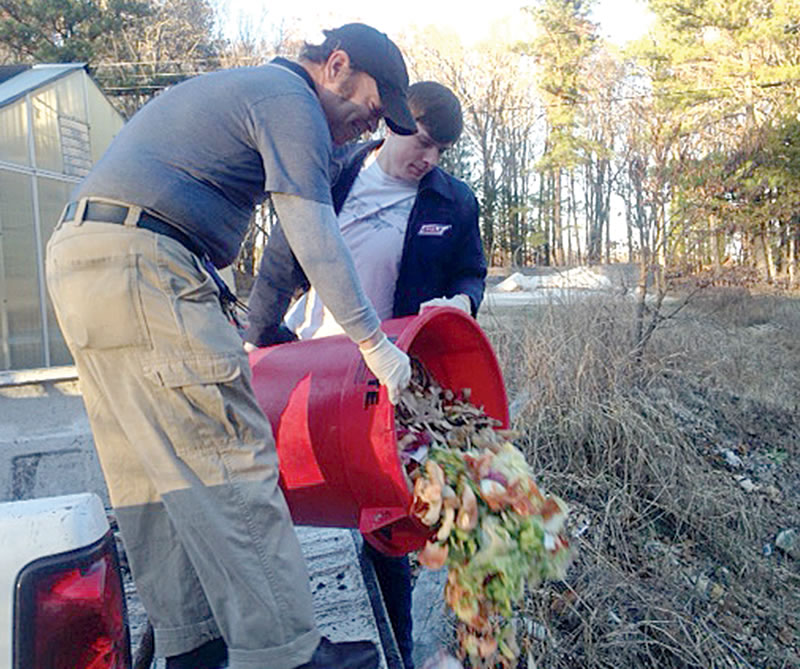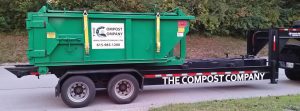Grants and new rules help facilitate start-up of composting operations, establishing a framework to improve organics management in the state.
Alle Crampton
BioCycle February 2017

Tennessee Department of Environment and Conservation revised its composting rules in 2016, creating a “friendlier regulatory environment” than when The Compost Company got started 5 years earlier (facility in photo). Photo courtesy of the Compost Company
The Tennessee Department of Environment and Conservation (TDEC) plays an important role in increasing diversion of organics from landfills in Tennessee. “The State of Tennessee has a vested interest in improving the way organic wastes are managed,” notes Pat Flood, Director of TDEC’s Division of Solid Waste Management. “We’ve started with some simple steps that are foundational to our efforts. One was to streamline and improve the way composting facilities are permitted so that we encourage the siting of more facilities throughout the state. Also, as part of the Statewide Solid Waste Plan, we’ve created the framework to implement organics management improvements in the years ahead.” TDEC’s 2025 Solid Waste and Materials Management Plan (the 2025 Plan), and the new or updated composting regulations help facilitate achieving these goals.
The 2025 Plan, adopted in April 2015, is TDEC’s roadmap to reduce the amount of materials thrown away, and increase the rate of recycling in Tennessee. Eight objectives are listed in the 2025 Plan; objective 4 is completely dedicated to increasing the diversion of organics and encourages material reuse, composting, and beneficial use. Objective 4 also promotes implementing source reduction. Objective 5 supports new waste reduction and recycling technology. This includes changing the existing “composting grant” into an “organics management grant” so that anaerobic digestion, anaerobic fermentation, gasification, biodiesel production, biomass-to-energy, and pyrolysis are eligible projects.
2016 Composting Grants
In January 2016, TDEC awarded and executed four composting grants, totaling $1,360,453. Three of the four — Sevier Solid Waste, Inc., Friends of Henry Horton State Park, Inc., and the University of Tennessee — utilized the grants to purchase necessary equipment for composting operations. “The Friends of Henry Horton State Park in partnership with the City of Chapel Hill received $99,000 to expand the State Park’s composting operations,” notes Ryan Jenkins, Henry Horton State Park Manager. “The funds helped us purchase a chipper, collection bins, a tractor, a greenhouse, and rain barrels.”
The new greenhouse was purchased to add to the existing gardens to help facilitate growing produce for the park restaurant year around. Rain barrels were purchased for the structures around the park and the water will be used for the gardens. “The produce grown in the greenhouse and gardens are then taken to the park restaurant so the park guests can have fresh and healthy produce available in their meals,” adds Jenkins. “The cycle for producing compost is then started again as the organic matter is sent to the collection bins. We are truly hoping to be a model for other Tennessee State Parks and state run operations.”
Several state parks where composting should be prioritized have been identified. ”Tennessee State Parks are currently composting preconsumer waste such as food prep scraps, coffee filters, and tea bags at three locations including Natchez Trace (seasonal), Montgomery Bell, and David Crockett,” explains Karen Yerbich, Tennessee State Parks Director of Food & Beverage Operations. “In the future, they plan to evaluate restaurant procedures to potentially reduce food waste by diversion, donation, and composting at additional parks. There are even some parks, such as Warrior’s Path, that are interested in and working towards composting horse manure from their stables.”
Composting Regulations
As of July 7, 2016, TDEC’s regulations pertaining to the permitting process for composting facilities changed. New regulations are based on the US Composting Council’s (USCC) Model Compost Rule Template (MCRT). According to TDEC’s Division of Solid Waste Management, the MCRT was “created by the USCC, the Georgia Environmental Protection Division, and a volunteer Task Force consisting of state composting regulators, composting facility operators, and other consultants.”

Montgomery Bell State Park composts preconsumer food prep scraps, coffee filters and tea bags from the park’s restaurant.
One noticeable change in Tennessee’s new regulations is the replacement of certain words. For example, the word “residuals” is used instead of “waste.” This change occurred because the USCC, “decided to use the term ‘residuals’ to indicate that the raw materials going into the manufacture of compost are resources that can be converted into products via the process of composting.”
Also, what was previously known as “leachate” is now referred to as “contact water.” The MCRT distinguished between contact water — water that has come in contact with raw feedstocks in the tipping and mixing area(s) and active composting piles — and storm water, which is water that has not come into contact with raw feedstocks or active composting piles. “We refer to water that has come in contact with raw feedstocks or active composting piles as ‘contact water’ because the requirements for managing ‘leachate’ in our regulations are more stringent than is necessary for composting operations,” notes Robert Wadley, an Environmental Scientist with TDEC’s Division of Solid Waste Management. “‘Contact water’ does not include water from curing piles, finished compost, or product storage piles, since that material is a ‘product’ not a ‘waste’.”
The new composting rules group organic wastes into three different types, and then further break them down into three different tiers depending on the potential risk they pose for both human and environmental health. Type One consists of materials that pose a low risk to human health and the environment, including yard trimmings, woody materials and crop residuals. Type Two consists more of agricultural residuals, industrial by-products, agency-approved food processing residuals and source separated organics, which also pose low risk for human health and environment. Type Three consists of mixed solid waste, sludge, diapers and biosolids, which pose a higher risk to human health and the environment from physical and chemical contaminants.
In addition, the new rules allow small-scale composting operations to accept food scraps and vegetative debris from outside sources without a permit, as long as their output does not exceed 50 cubic yards a year (100 cubic yards a year if using an in-vessel system). This is an important change, according to Wadley: “In the past, the old regulations would only allow processing of site-generated waste with a permit.” For example, community gardens, urban farms, and other agricultural operations can now accept compostables from residential sources. These small-scale agricultural composting operations can also sell or give away their compost to be used at other agricultural operations.
The move to update the rules came after more than $2.2 million in grants were awarded for recycling equipment, waste reduction, and used oil recycling. Another $2.4 million was distributed to local governments and nonprofit organizations for the purchase of composting equipment or facility infrastructure for composting.
The new rules also are a show of support for this country’s first-ever national food waste reduction goal, where the United States Department of Agriculture and the United States Environmental Protection Agency called for a 50 percent reduction by 2030. “We’re enjoying a friendlier regulatory environment than we did when we got started five years ago, thanks to TDEC’s adoption of the MCRT guidelines for commercial composting,” says Clay Ezell, President of The Compost Company. “And the state’s Solid Waste Plan for 2025 is another step in the right direction. We have a lot of work to do to increase public awareness about the impact organics diversion can have on the waste stream, but thankfully we have great momentum and foresee a bright future for composting in our region.”
Alle Crampton is with the Tennessee Department of Environment and Conservation’s Office of Sustainable Practices.











